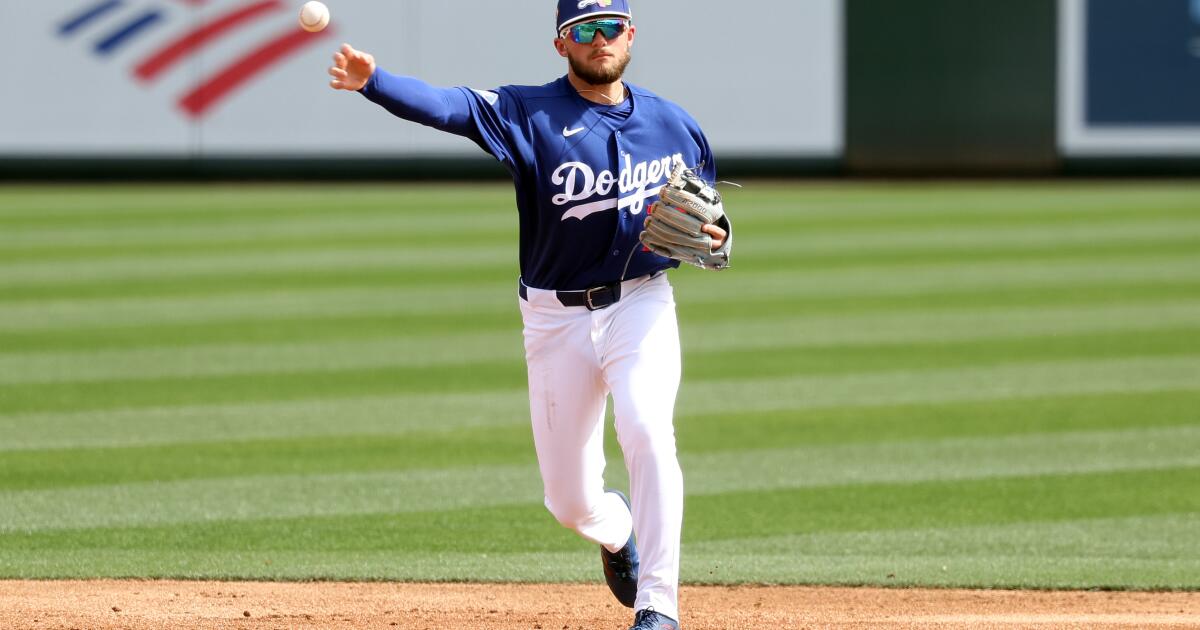Dodgers’ Alex Freeland trying to take advantage of reps at second base
PHOENIX — For 24-year-old Alex Freeland, the time is now.
After the switch-hitting middle infielder enjoyed a cup of coffee in the big leagues last season, he’s trying to break camp with the Dodgers and get increased playing time at second base with veteran Tommy Edman expected to be on the injured list as he works his way back from right ankle surgery.
Freeland, who played 29 games with the Dodgers last season, and second-year utility man Hyeseong Kim, who played 71 games and was on the postseason roster, are among those vying for playing time at the start of the season, with veteran Miguel Rojas and and nonroster invite Santiago Espinal also in the mix.
Kim, who started Cactus League games at second base and center field, recently departed for the World Baseball Classic as he competes for Team South Korea, opening a door for Freeland to get more reps in the heart of the Cactus League season.
“Opportunity is present, so I’m trying to make the most of it,” Freeland said. “It sucks that Tommy’s not ready and he won’t be ready for the beginning of the season. He’s a big part of this team, so I wish him a super speedy recovery and I hope that he gets out there as quickly as possible. But yeah, with Hyeseong being gone, I am getting more reps at second and short, so I’m just trying to make the most of them.”
Freeland entered last season as MLB Pipeline’s No. 45 overall prospect. Though he posted a .190/.292/.310 slash line at the big league level, prospect analyst Jim Callis still has high hopes for Freeland.
“Freeland doesn’t have a wow tool but he does a lot of things well,” Callis said. “His best attribute is probably his defense at shortstop and versatility to play other positions. He’s a switch-hitter who draws a lot of walks and has some sneaky pop. He’s just an average runner, but his instincts allow him to play quicker than that.”
As a switch-hitter, Freeland has had more success from the left side than the right. He worked on his swing from both sides of the plate over the offseason and feels he’s in a good place.
“My right-handed hitting could be better,” Freeland said. “I mean, part of my game is walking, so I felt like I wasn’t patient at the right times last year. Sometimes I was too patient, just taking pitches down the middle. Walking is a big part of my game, so I’m looking to walk, and I feel like I’ve done that this spring training.”
Freeland has drawn eight walks in 24 plate appearances in Cactus League play, and Dodgers manager Dave Roberts has been impressed with what he has seen this spring.
“Maturity,” Roberts said. “Playing both sides of the baseball really well. The bat, right-handed looks really good. Lefty is typically his strong side, but I like the right-handed at-bats. Just playing with a lot of real confidence.”
If it weren’t for the Dodgers’ star-studded roster, Callis believes Freeland’s chances at playing time would be better.
“On a lot of teams, Freeland would be getting a chance to compete for the starting shortstop job, but he’s blocked on the Dodgers,” Callis said. “He’s probably looking at more of a utility role than starting in Los Angeles, and he could be attractive to other clubs in trade talks too.”
Freeland, however, is embracing his role and hopes to earn his stripes. He’s tried to soak up as much as he can from the veteran stars he’s been able to spend time with.
“Miggy Ro has always got something good to say. Muncy, Freddie, I mean they’ve been around so long, they’ve seen so many different things, so it’s like whatever I have a question about, like I can easily go and talk to one of them, and they’ve got an answer for me,” Freeland said of Rojas, Max Muncy and Freddie Freeman. “And it’s great to have guys like that in the clubhouse.”
Freeland grew up an Atlanta Braves fan and admired Freeman for years. Freeland never imagined he one day would share a locker room with the nine-time All-Star first baseman, who spent the first 12 years of his career in Atlanta.
“I watched Freddie growing up and Mookie,” Freeland said of Freeman and Betts. “So, I mean, it’s kind of like a full-circle moment, like I watched Freddie a lot when he was with the Braves, coming up, because I lived in Georgia, so like I’d go and watch minor league games and see him in Gwinett.”
